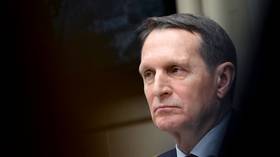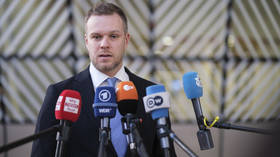West considering large-scale conflict – Russian spy chief

A number of Western leaders believe they would be able to maintain their hegemony if they plunge the world deeper into turmoil, information possessed by Russia’s Foreign Intelligence Service (SVR) suggests, according to the agency’s head, Sergey Naryshkin.
The SVR chief’s statements come as French President Emmanuel Macron and several officials from the Baltic states have repeatedly hinted in recent months at the possibility of deploying Western troops to Ukraine. Russia has warned that such a move would escalate the conflict.
Speaking during a plenary meeting of the Federation Council on Tuesday, Naryshkin stated that his agency had obtained information that “some Euro-Atlantic politicians consider it possible to unleash a large-scale military conflict in order to maintain their hegemony.”
He noted that there are “strong reasons” to believe that such an escalation could actually occur if the West decides that it would be “reasonably safe” and beneficial to its interests.
However, the spy chief admitted that there are also “truly responsible” global and regional players in the world who, if united, could have the potential to “ensure the impossibility of unleashing such a conflict, including the use of nuclear weapons.”
Russian special services will continue to monitor the development of the situation “very closely,” Naryshkin stated.
Macron has consistently refused to rule out the idea of sending NATO forces into Ukraine, calling such threats “necessary” to maintain the West’s “strategic ambiguity.” While NATO and most of its members, as well as the EU, have vehemently denied the possibility of such a move, Lithuania has backed Macron’s proposal. Meanwhile, Madis Roll, the national security adviser to Estonian President Alar Karis, has also stated that Tallinn was “seriously” considering sending troops to fill “rear” roles in Ukraine.
Moscow has repeatedly warned that any NATO troop deployment to Ukraine would be treated as a major escalation and would almost certainly lead to a direct confrontation between Russia and the US-led bloc.
Russia’s Foreign Ministry has also pointed out that any NATO troops that appear in the conflict zone would “inevitably become targets for the Russian military,” as would any foreign-supplied weapons used to strike Russian territory, no matter if they are deployed in Ukraine or elsewhere.














